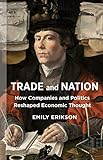Trade and Nation : How Companies and Politics Reshaped Economic Thought / Emily Erikson.
Material type: TextSeries: The Middle Range SeriesPublisher: New York, NY : Columbia University Press, [2021]Copyright date: ©2021Description: 1 online resource : 40 b&w figuresContent type:
TextSeries: The Middle Range SeriesPublisher: New York, NY : Columbia University Press, [2021]Copyright date: ©2021Description: 1 online resource : 40 b&w figuresContent type: - 9780231545440
- Free trade -- Great Britain -- History -- 17th century
- Merchants -- Great Britain -- History -- 17th century
- Handel
- Identität
- Nationenbildung
- Ökonomische Bildung
- BUSINESS & ECONOMICS / Economic History
- early modern history
- economic history
- economic sociology
- historical sociology
- history of capitalism
- mercantilism
- online - DeGruyter
| Item type | Current library | Call number | URL | Status | Notes | Barcode | |
|---|---|---|---|---|---|---|---|
 eBook
eBook
|
Biblioteca "Angelicum" Pont. Univ. S.Tommaso d'Aquino Nuvola online | online - DeGruyter (Browse shelf(Opens below)) | Online access | Not for loan (Accesso limitato) | Accesso per gli utenti autorizzati / Access for authorized users | (dgr)9780231545440 |
Browsing Biblioteca "Angelicum" Pont. Univ. S.Tommaso d'Aquino shelves, Shelving location: Nuvola online Close shelf browser (Hides shelf browser)

|

|

|

|

|

|

|
||
| online - DeGruyter Leader Communities : The Consecration of Elites in Djursholm / | online - DeGruyter Democratic Transition in the Muslim World : A Global Perspective / | online - DeGruyter Ascent to Glory : How One Hundred Years of Solitude Was Written and Became a Global Classic / | online - DeGruyter Trade and Nation : How Companies and Politics Reshaped Economic Thought / | online - DeGruyter Taking Back Philosophy : A Multicultural Manifesto / | online - DeGruyter Erotic Poems from the Sanskrit : An Anthology. | online - DeGruyter America the Beautiful and Violent : Black Youth and Neighborhood Trauma in Chicago / |
Frontmatter -- CONTENTS -- ACKNOWLEDGMENTS -- Introduction -- Chapter One. The Declining Importance of Fair Exchange -- Chapter Two. Transformative Debates -- Chapter Three. Key Actors, Institutions, and Relations -- Chapter Four. Authors and Their Networks -- Chapter Five. Representation, Companies, and Publications -- Chapter Six. Why Not the Dutch? -- Conclusion -- BIBLIOGRAPHY -- INDEX
restricted access online access with authorization star
http://purl.org/coar/access_right/c_16ec
In the seventeenth century, English economic theorists lost interest in the moral status of exchange and became increasingly concerned with the roots of national prosperity. This shift marked the origins of classical political economy and provided the foundation for the contemporary discipline of economics. The seventeenth-century revolution in economic thought fundamentally reshaped the way economic processes have been interpreted and understood. In Trade and Nation, Emily Erikson brings together historical, comparative, and computational methods to explain the institutional forces that brought about this transformation.Erikson pinpoints how the rise of the company form in confluence with the political marginalization of English merchants created an opening for public argumentation over economic matters. Independent merchants, who were excluded from state institutions and vast areas of trade, confronted the power and influence of crown-endorsed chartered companies. Their distance from the halls of government drove them to take their case to the public sphere. The number of merchant-authored economic texts rose as members of this class sought to show that their preferred policies would contribute to the benefit of the state and commonwealth. In doing so, they created and disseminated a new moral framework of growth, prosperity, and wealth for evaluating economic behavior. By using computational methods to document these processes, Trade and Nation provides both compelling evidence and a prototype for how methodological innovations can help to provide new insights into large-scale social processes.
Mode of access: Internet via World Wide Web.
In English.
Description based on online resource; title from PDF title page (publisher's Web site, viewed 01. Dez 2022)


